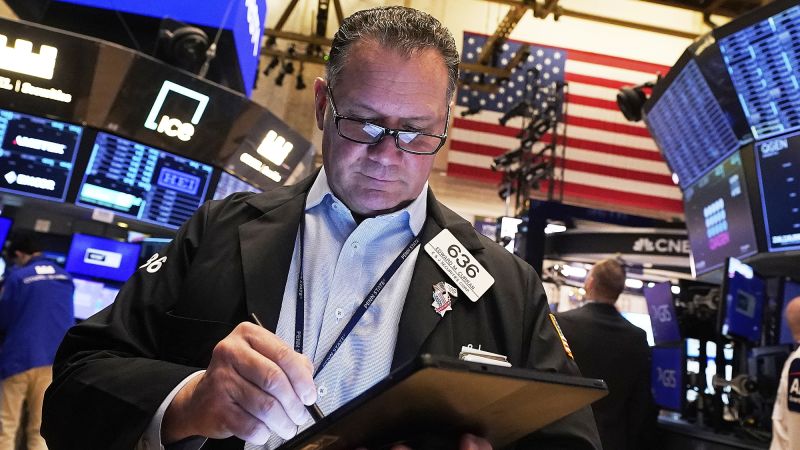New York
CNN
—
US stocks slid Monday and a historic rally for the S&P 500 lost steam as Wall Street awaited potential developments in trade negotiations between the United States and other countries.
The Dow lost 99 points, or 0.24%. The broader S&P 500 fell 0.64% and the tech-heavy Nasdaq Composite slid 0.74%.
The S&P 500 snapped a nine-day winning streak, which was its longest winning streak since 2004. The Dow also snapped a nine-day winning streak, which was its longest since 2023.
This week marks one month since President Donald Trump announced a 90-day pause on his “reciprocal” tariffs on countries except China. Wall Street has received a boost in the past month due to the tariff pause, yet there is continued uncertainty about what trade deals might actually look like.
“The market is intensely focused on where the tariff rates end up, and it’s bouncing around day to day as those assessments change,” said Jed Ellerbroek, portfolio manager at Argent Capital Management. “I don’t think anybody really has a good idea of what’s to come.”
Treasury Secretary Scott Bessent on Monday told CNBC that the Trump administration is “very close” to trade deals with other countries, echoing comments made by Trump on Sunday that trade deals “could very well” happen this week.
“We’re negotiating with many countries, but at the end of this I’ll set my own deals because I set the deal, they don’t set the deal, I set the deal,” Trump said to reporters aboard Air Force One on Sunday.
Ellerbroek said while it’s difficult to predict what will come out of the next few weeks, he doesn’t expect “real, fulsome trade deals” will emerge in the span of the 90-day pause.
“I don’t anticipate a satisfactory conclusion of this tariff issue in the 90 days,” he said.
Stocks opened the day lower before trimming losses across the day as a new report from the Institute for Supply Management showed growth in the services industry in April. However, the report also showed rising price pressures and looming uncertainty around tariffs.
“Uncertainty remains the dominating theme as the US government has been maddeningly inconsistent with tariff implementation,” said one survey respondent in the real estate, rental and leasing industry.
The White House on Monday said no “final” decisions have been made on imposing new tariffs on films produced outside the United States. The statement comes after Trump on Sunday said he would apply a new 100% duty on foreign-made motion pictures.
Shares in major filmmakers wavered on Monday as Hollywood tried to digest the implications of a potential tariff, which were not immediately clear. Netflix (NFLX) was down 1.94%. Disney (DIS) fell 0.41% and Paramount (PARA) slid 1.57%. Warner Bros. Discovery (WBD) slid 1.99%. (CNN is owned by Warner Bros. Discovery).
“Markets remain highly vulnerable to negative data and policy announcements,” analysts at Invesco said in a Monday note.
In commodities markets, oil prices tumbled Monday after OPEC+ over the weekend announced plans to increase production. US oil fell 1.99% to around $57.13 a barrel, hovering around its lowest level in over four years. Brent crude, the global benchmark, slid 1.7% to around $60.25 a barrel and also hovered around its lowest level in over four years.
Gold surged more than 2.5% to rise above $3,300 a troy ounce as investors flocked back to the haven metal. Gold, which has soared to new highs this year, has fluctuated the past two weeks after briefly topping a record high $3,500 a troy ounce on April 22.
Investors this week will be focused on the Federal Reserve’s decision on monetary policy and remarks from Fed Chair Jerome Powell on Wednesday afternoon. Traders widely expect the central bank to hold rates steady, according to the CME FedWatch Tool.
“Uncertainty rules amid a trade war and the ever-changing landscape of tariffs. But with the hard data on consumer spending and employment still hanging in there, the Fed will remain firmly planted on the sidelines,” said Greg McBride, chief financial analyst at Bankrate, in emailed remarks.
After Commerce Department data last week showed better-than-expected job growth, traders and Wall Street analysts have dialed back their expectations for rate cuts this year. Barclays and Goldman Sachs on Friday pushed back their expectation for the first Fed rate cut this year to July from June.
“Greed” was the sentiment driving markets on Monday for the first time since December, according to CNN’s Fear and Greed Index.

